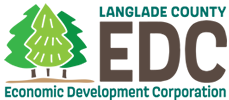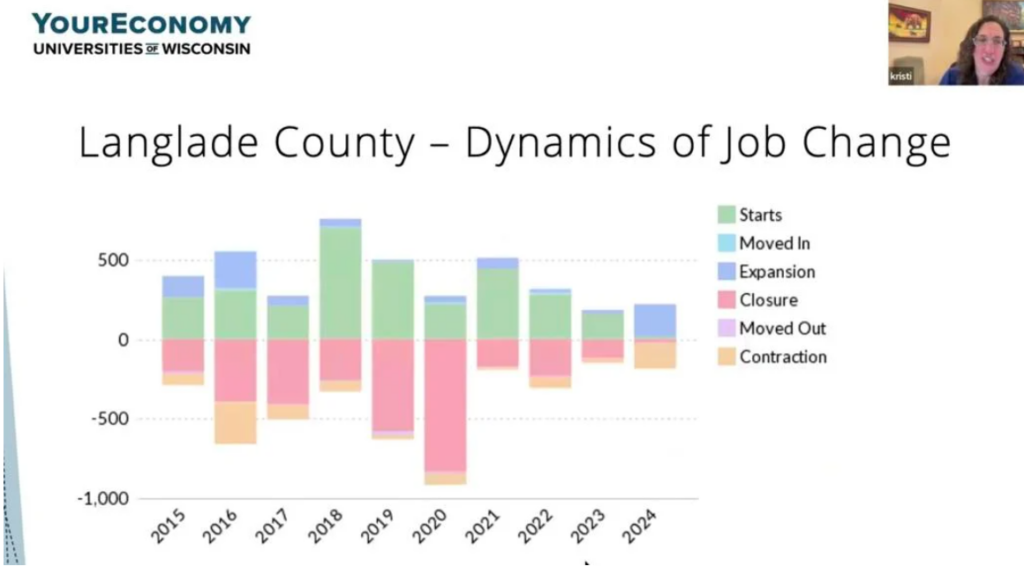Pandemic’s impact on economy discussed at business summit
A collection of local business owners attended the Langlade County Business Summit last week Thursday at the Northstar Lanes Banquet Center.
The event, hosted in part by the Langlade County Economic Development Corporation (LCEDC), was the first such summit held since COVID, and with its theme, “Economic Revival in a Post-COVID Era,” also focused on the pandemic’s impact on the community.
“In collaboration with the City of Antigo and the Antigo/Langlade County Chamber of Commerce, we saw this as a valuable opportunity to demonstrate our commitment to working together,” LCEDC Executive Director Angie Close said. “Our goal was to ensure that local businesses know we’re united in providing them with the resources they need to thrive and grow right here in Langlade County.”
The summit’s keynote speaker was Kristi Smith, a business consultant with YourEconomy, a University of Wisconsin organization that provides economic resources to rural communities, among other roles.
Smith said her organization helps communities understand the impact of state or federal policies on their economies and gathers data on agricultural, governmental, and small business employers, entities that the Census Bureau or Bureau of Labor Statistics often exclude when conducting their surveys.
“We include every geography, even rural communities,” Smith said. “And because of the nature of our data source where we actually have the names and addresses and phone numbers of every business that we’re tracking, we can provide very granular information that is restricted by law from other government data sources. So we can report on the number of jobs where people work, not where payroll is filed, not where corporate headquarters are, but where the local jobs are, and provide really granular information. Especially in rural communities, we’re one of a kind.”
Midway through her presentation, Smith broke down the economic make-up of Langlade County at a relatively granular level as well.
A chart Kristi Smith showed during the presentation.
“I mentioned that 63% of jobs in Wisconsin are in establishments with less than 100 jobs. Langlade County is even more — 78% of workers in Langlade County are working in a place with fewer than 100 coworkers. You guys, small businesses in your community, are all there is. And so think about that. Your contributions to the tax base are massive. Your contributions to the local economy are powerful. So even though you might be like, ‘Well, I’m just a small business,’ you’re really contributing tremendously to the pattern of jobs and to the economic vitality of your community,” she said.
She said the county’s particular economic make-up may have contributed to what she described as its relatively quick recovery following the pandemic which, unlike most of the rest of the country, did not extend into 2022.
“The U.S. as a whole and in Wisconsin saw a dip in 2022, and you folks didn’t. In fact, you’ve seen kind of a continuing growth throughout that. The real story is, while everyone else was suffering in 2022, you folks weren’t, and some of that was because of the smaller businesses. Smaller businesses tend not to do temporary layoffs the way larger businesses do, and that’s because we know we can’t find the people again that quickly. We treat the employees like our own flesh and blood — sometimes to our own detriment I might add,” Smith laughed. “But a lot of small business owners, rather than laying people off when things are a little bit rocky, will cut their own wages in order to keep their staff, and so we see that pattern here really strongly in your county.”
She said Langlade County received at least $24.5 million in state and federal relief funds following the pandemic, something she characterized as mostly positive and praised local economic leaders like Close for facilitating.
“Some of you might be thinking, ‘Well that’s a lot of money, and I didn’t get any of it,’ and that might have happened. You might not have directly applied for any of this money,” Smith said. “But in communities like yours, money recycles in the community. So if you didn’t receive the grant, if you didn’t receive the forgivable loan, you likely benefited indirectly because this money went to your vendors, it went to your customers, it went to keep other people in your community employed so they could buy from you. Your landlord didn’t lose their job and decide to sell the building. So even if you didn’t receive money directly, this $24.5 million plus that came into your county, they did keep your business and others around you in business, because they kept your customers and your vendors and your community vibrant.”
Alan Toliver, a business mentor with SCORE, a national organization dedicated to guiding entrepreneurs, also spoke at the event, calling on attendees to go to score.org in order to leverage its free resources.
“If you wanted to create a business plan, you don’t have to go searching for one — SCORE’s got a template out there for you,” said Toliver, who also partners with the LCEDC. “You want to do some financial analysis, they’ve got templates. There’s a whole cadre of templates and resources that are out there that you can start using immediately, and I would encourage you to do it and I would encourage you to explain it to other people because again, it’s a resource that’s available, it’s free, and I think it’s one of the most supportive organizations to businesses that are out there.”
The summit also included a breakout session during which entrepreneurs shared particulars of their businesses, including strategies they had pursued when faced with change.
Source: Antigo Daily Journal October 18, 2024 issue

